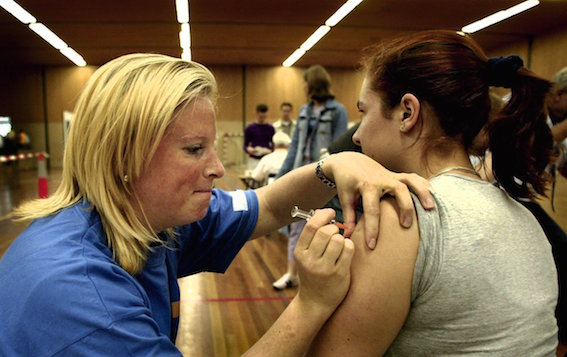The number of meningococcal infections is on the rise, but there is a shortage of vaccines. What is meningococcal disease and what is the chance that a child will be infected? EenVandaag answers the questions of viewers about the disease and the new vaccine.
What is meningococcal disease?
The meningococcal bacteria can cause a very serious infection called meningococcal disease. The clinical picture resembles that of the flu, but the meningococcal disease can cause septicemia or meningitis. People with the disease often experience nausea, high fever, fatigue, diarrhea and a generally flu-like feeling. A characteristic of meningococcus is that these symptoms can be accompanied by a stiff neck and red or purple spots on the skin. There are several types of the bacteria. The bacteria is spread by, among other things, coughing, sneezing and kissing. Antibiotics work well against meningococcus, but the disease develops very quickly, so antibiotics can come too late. People can die from the disease.
LOOK & READ ALSO:
Why is it that the number of cases of meningococcus is increasing so much?
For the past three years there has been an increase in the number of cases of meningococcal type W. The exact reason for the increase in infections is not clear. The National Institute for Public Health and the Environment (RIVM) thinks it is due to a change in the bacteria.
In the Netherlands, fourteen-month-old children have been vaccinated against meningococci type C since 2002. Due to the increase, the vaccine for type C is now supplemented with a vaccination against types A, W and Y. (vaccine ACWY). Fourteen-year-old children are also called upon to get vaccinated with the ACWY vaccine.
Has the ACWY vaccine been researched?
The RIVM reports that research has been conducted into the ACWY vaccines that are currently used in the Netherlands. This research shows that the ACWY vaccines are safe. The ACWY vaccine is also used in the United Kingdom and Austria. There it is included in the vaccination program. The vaccine is also used for travelers traveling to areas where meningococcus is common. The studies can be found on the website of the RIVM.
Why aren’t adults called up for the ACWY vaccine?
The age groups at increased risk of infection are generally the elderly, teenagers between the ages of fourteen and twenty, and children under the age of five. Teenagers are primarily at risk of infection and thus of spread, because they often live in large, social groups that are physically close to each other. That’s why fourteen-year-old children are currently being called up for the vaccination. “By vaccinating a specific risk group, the chance of reducing the bacteria is greatest and the fastest result is achieved”, says the GGD. Because this group also ensures spread and is now vaccinated, other age groups, such as adults, are also indirectly protected.
Children of fourteen months have already been vaccinated against meningococci type C. They still receive the vaccination at fourteen months, only this is now supplemented with the ACWY.
What is the chance that you will get meningococcal disease type W?
The RIVM reports that the number of cases of meningococcal disease W has increased, but that the chance of becoming ill is still very small. If you nevertheless want to have your child vaccinated with the ACWY vaccine, you can request a consultation via the general practitioner, GGD or the vaccination center. It costs sixty euros. Due to the scarcity of vaccines, there is no guarantee that the vaccine will be available at all times.
Source: RIVM, GGD and EenVandaag
– .


